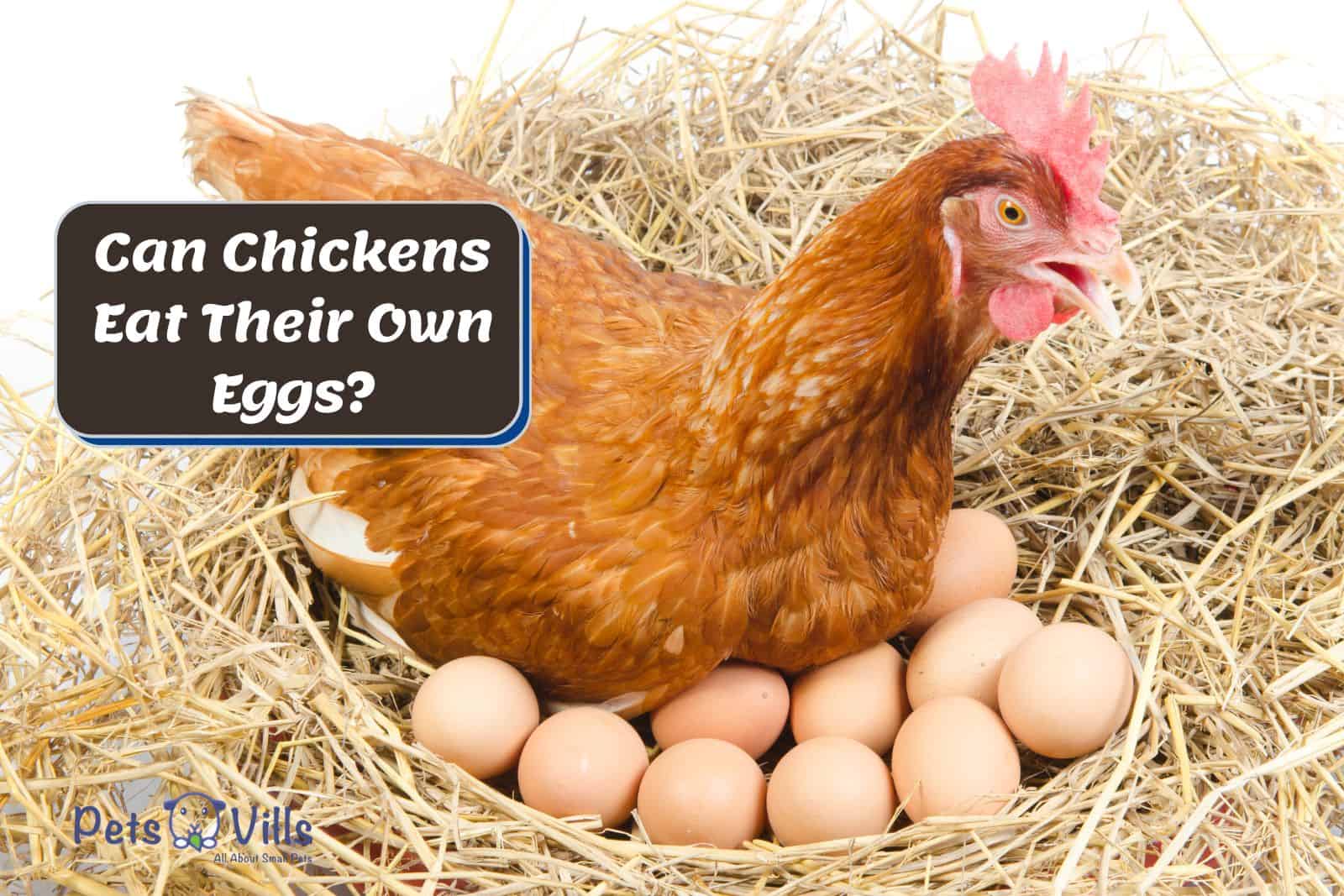Chickens aren’t known to be the pickiest eaters among animals. Therefore, it’s common to wonder whether they’d eat their own eggs. It’s certainly crossed my mind when watching over my flock.
So do chickens eat their own eggs? According to my research, the opportunist nature of a chicken’s appetite can cause it to eat its eggs (1).
However, there’s much more to discuss on this topic.
But if you keep reading, I’ll ensure you know all about the causes and how to prevent them!
Table of Contents
Key Takeaways
- Chickens will eat their eggs, but it’s often a sign of something being wrong. In other words, it’s not typical behavior for them.
- Some common reasons for egg-eating behavior include calcium deficiency, boredom, stress/anxiety, cramped nest boxes, and hunger.
- Owners can prevent egg-eating by collecting the eggs frequently and providing a well-balanced diet with plenty of calcium.
Why Chickens Eat Their Own Eggs?
A chicken eating its eggs is often a result of the following reasons: calcium deficiency, boredom, stress/anxiety, cramped nesting conditions, or hunger.
Let’s take a deep look at them to grasp a better understanding of this issue. These discussions could prevent it from occurring before it even starts.
#1 Calcium Deficiency
Hens require significant amounts of calcium when laying eggs. During this period, experts recommend getting around 4 to 5 grams of calcium daily.
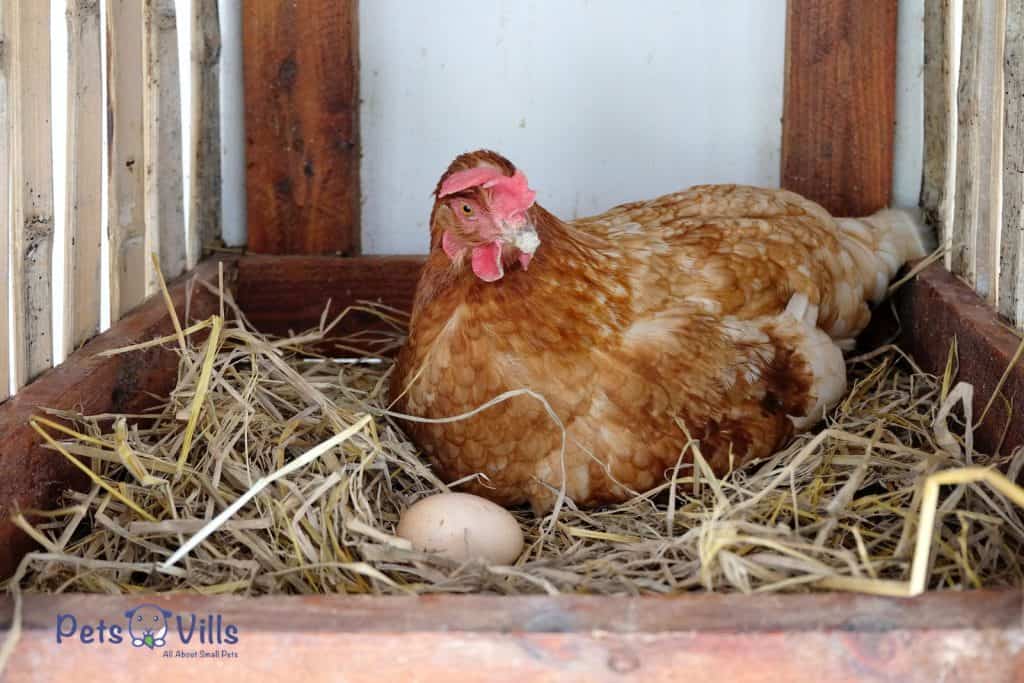
This extra calcium is vital to ensuring a successful egg-laying process. Otherwise, your hens could eat their eggs to obtain this additional calcium.
After all, eggshells are roughly 40% calcium, so it’s an easy source. It’s why chicken owners must be cautious during these periods to avoid this issue.
I’ve managed to remedy the problem by adding high-calcium foods to their diets. Some usable options include kale, spinach, or even okra.
All of these vegetables would be excellent additions to a hen’s diet. I haven’t had a single problem with hens eating their egg since introducing them.
Another option would be feeding hens dairy products like yogurt, milk, or cheese. But I’d only recommend these calcium sources if veggies aren’t an option.
Sadly, dairy products come with high-fat content. So they can cause weight issues when given to chickens regularly.
#2 Boredom
Boredom is a common problem for chickens who cannot roam free. It’s another reason why I prefer a roam-free setup to other options.
Furthermore, chickens benefit more from roam-free setups. These animals are active creatures who need space for their constant food-foraging activities.
If chickens don’t get this space, they often become bored. It’ll result in them pecking at everything around them inside their chicken coop.
So nearby eggs are an obvious target for this mindless pecking. Eventually, this bad habit will cause them to eat the chicken eggs.
An easy solution to this problem would be providing them with enough space. But if your area is limited, putting pecking toys by their coop is beneficial.
I’ve seen the toys work wonders to cure a chicken’s boredom by keeping them busy. My flock never seems to get enough of them.
Another exciting option is hanging vegetables in a tether ball position. But ensure they’re healthy choices such as lettuce or cabbage to avoid messing up their diet.
Deepen your understanding of poultry health by reading our informative article “Do Chickens Need Sunlight?” – a critical resource for ensuring your flock’s wellbeing.
#3 Stress & Anxiety
Chickens aren’t immune to feeling stressed or anxious. But, as with humans, these situations can make them act out in unusual ways.
So it makes sense that these issues would result in an egg-eating chicken. But the real question is, what’s causing them to feel stressed or anxious?
In my experience, a crowded chicken coop or small living quarters is often the cause. The lack of space makes them overwhelmed and causes unusual behaviors.
Another possibility for causing stress is a lighting issue. Your chicken will feel uneasy if there’s too much or too little.
In response, they’ll attempt to relieve this uneasy feeling. One of the more common methods for chickens is eating their eggs.
You’ll need to find a way to combat these feelings. If you don’t, the stress will negatively affect your flock’s actions and overall well-being.
Prolonged stress can even lead to serious health concerns. In more severe cases, it’ll cause them to die.
#4 Cramped Nest Box
Hens require a quiet and ample space when laying their eggs. It’s a vital part of ensuring egg production is booming.
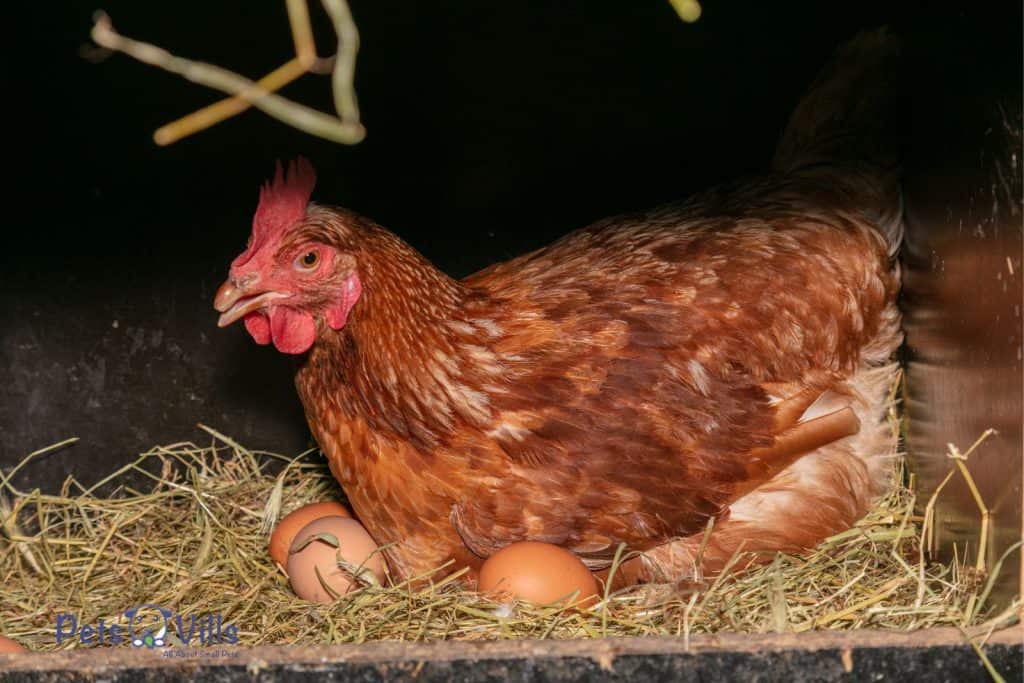
My recommendation would be to have at least “one (nest box) per 4 to 5 birds” (2). It’s a guideline that has never failed me.
They’ll start rolling over and breaking eggs if they don’t have enough space. So it’s not an ideal situation for anyone looking to cultivate successful egg production.
The situation can become even uglier when these boxes get too crowded. Then, your hens will start acting out by pecking at and eating each other’s eggs.
#5 Hunger
These birds require a significant amount of food daily to keep them active. It’s the only way to ensure they don’t suffer from nutritional deficiencies.
As a result, your flock will often spend their entire day foraging for food. This activity will even extend into the evening occasionally.
On average, the typical adult chicken must consume 1/4-pound of food daily. So you can expect the weekly number to be around 1.5 pounds.
If you don’t hit these numbers, they’ll start looking for food outside their feed. It’ll result in them foraging for food in the backyard or developing egg-eating habits.
The easiest way to avoid these behaviors is by offering them a balanced diet. You can accomplish this by using a high-quality feed.
For instance, these feeds are manufactured to meet your flock’s nutrition needs. I’d recommend using options with about 10-15% protein content.
But this number should increase to 16-18% during laying season. So your hens will need the extra protein to get through the process without any issues.
How To Stop Chickens From Eating Their Own Eggs
Since you know why a hen would eat its eggs, let’s look at prevention methods. These discussions will help ensure your flock never picks up this bad habit.
#1 Remove the Eggs Frequently
Your easiest prevention method is removing the eggs frequently. It’ll remove the temptation while making it easier to keep track of egg production.
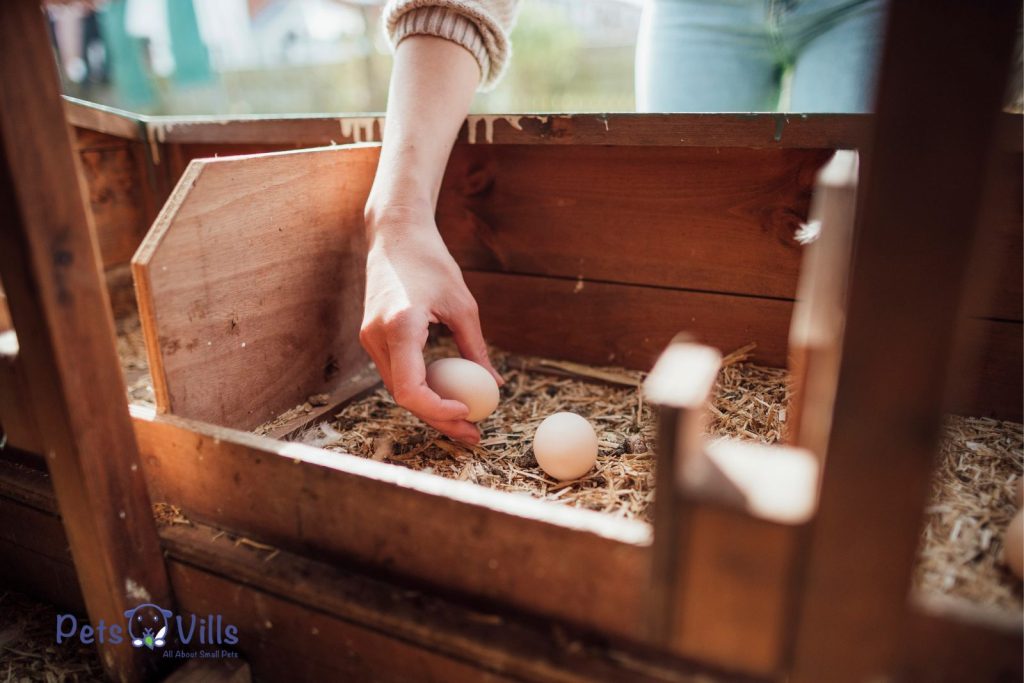
My recommended routine would be collecting once in the morning and at night. It keeps you from disrupting the hens too much and prevents this nasty habit.
It’ll reduce the chance of egg breakage and eating if done correctly. I haven’t had many issues since incorporating this routine.
#2 Make Sure Chickens Are Getting Plenty Of Calcium Content
Providing your flock with a well-balanced diet will stop them from eating their eggs (3). It ensures they get all their nutrition and prevents them from looking elsewhere.
So it becomes essential to choose high-quality chicken feed. These products are made specifically to have the proper nutrition, especially calcium.
I’d also suggest giving them supplemental calcium via additional food items. It’ll give them a boost to ensure their needs are met completely.
I’ve often accomplished this by using leftover eggshells from cooking. But please, crush the eggshells thoroughly to bits and pieces before mixing them into their feeds.
Do Chickens Eat Other Hens Eggs?
Your chickens will eat each other eggs. If they’re desperate enough to eat their own, they won’t have any issue eating another hen’s eggs.
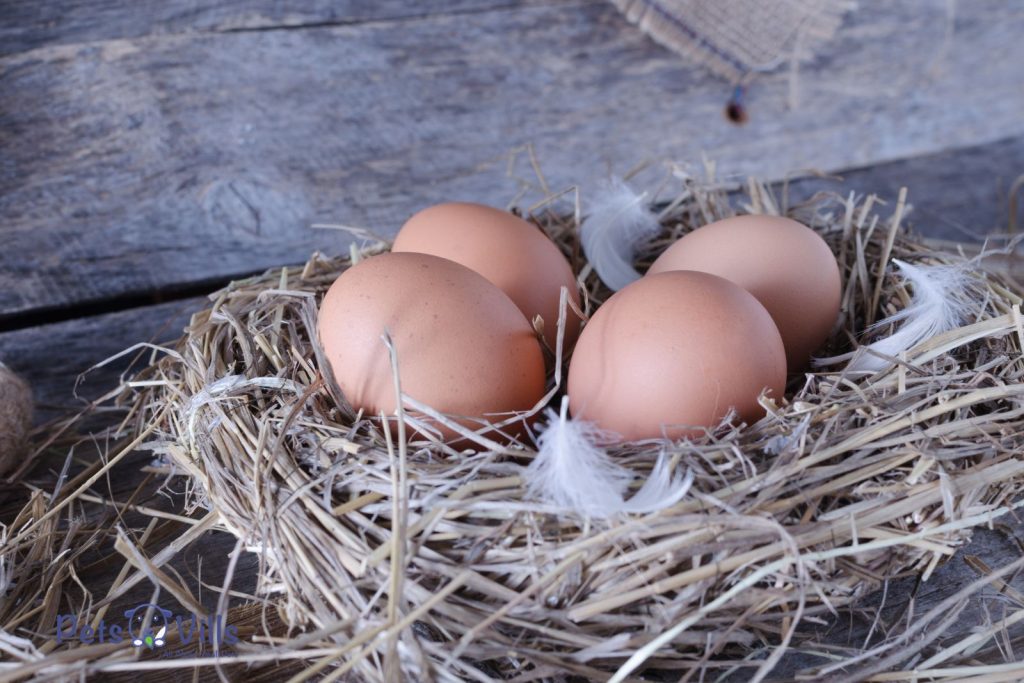
They won’t stop at only eating eggs, either. Here are several unusual items a hungry chicken won’t have any problem consuming if necessary:
- Dog food
- Cat food
- Fish food
- Crackers
- Drywalls
- Legos
As you can see, they will try to eat it if it seems edible.
FAQs
#1 Do chickens get stressed when you take their eggs?
Chickens don’t get stressed out when you take their eggs. So owners don’t have to feel bad about frequently collecting to avoid egg-eating issues.
#2 How do I know if my chickens are eating their eggs?
Egg-eating chickens will often have dried yolk on their beaks. You’ll also see yolk on their heads if they’re participating in the consumption of eggs.
Conclusion
In the end, do chickens eat their own eggs? Yes, chickens will eat their eggs. But there’s usually an underlying preventable reason for it.
So a chicken keeper needs to be vigilant and address the issue immediately. Otherwise, they will continue doing it until there are no eggs left.
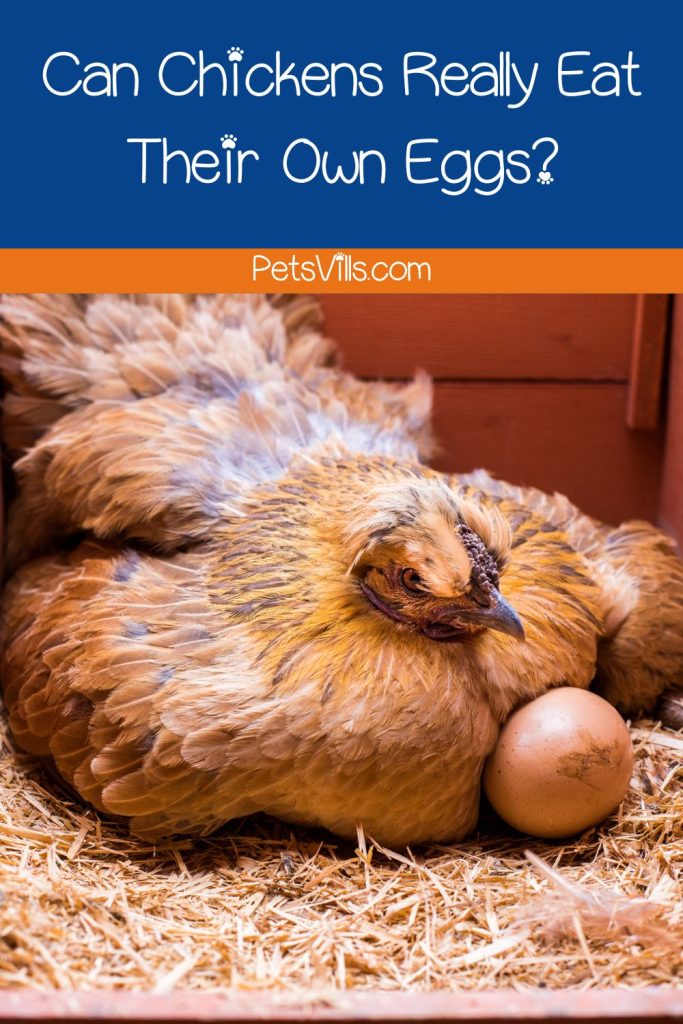
Resources
1. Causes for hens eating their eggs | Mississippi State University Extension Service [Internet]. extension.msstate.edu. [cited 2023 Feb 25]. Available from: http://extension.msstate.edu/content/causes-for-hens-eating-their-eggs
2. Raising chickens for eggs | UMN Extension [Internet]. Umn.edu. 2000. Available from: https://extension.umn.edu/small-scale-poultry/raising-chickens-eggs
3. Nutrition for the Backyard Flock [Internet]. extension.uga.edu. Available from: https://extension.uga.edu/publications/detail.html?number=C954&title=nutrition-for-the-backyard-flock
Alina Hartley is a small-town girl with a ginormous love of bearded dragons. It all started with Winchester, a baby bearded who was abandoned at the shelter by his former owners because of a birth defect that caused one front leg to be shorter than the other. Alina originally went to the shelter looking for a guinea pig, but one look at Winchester and it was love at first sight. From that day on, Alina has dedicated her life to learning everything she can about bearded dragons. She loves helping new beardie parents start their incredible journey with these magnificent reptiles.
Follow her on:
LINKEDIN
TWITTER.
Read her latest articles HERE
Learn more about her HERE.

